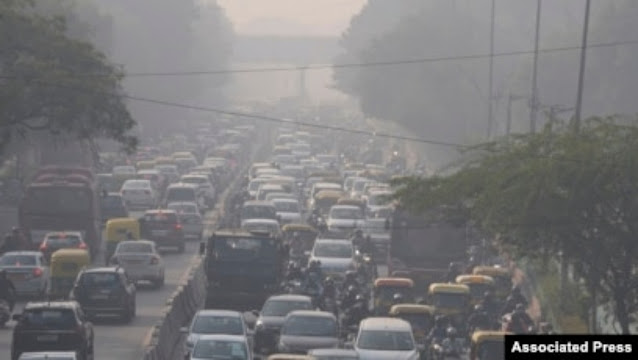New Delhi’s Air Pollution Crisis Prompts Shutdown of Thermal Plants, Schools, Colleges
pada tanggal
17 November 2021
NEW DELHI, LELEMUKU.COM - With the Indian capital enveloped in a haze of toxic smog, authorities ordered six thermal plants in the city’s vicinity to shut temporarily, closed schools and colleges indefinitely and imposed work-from-home restrictions to control pollution levels that turned severe on several days this month.
Baca Juga
“The emergency action is not a magic bullet that will address the pollution crisis,” said Anumita Rowchowdhury, executive director research and advocacy at New Delhi’s Center for Science and Environment. “It only ensures that it will not worsen the pollution but it will not clean the air.”
The world’s most polluted capital city has recorded levels for dangerous particles known as PM 2.5 that settle deep inside lungs many times higher than the standards set by the World Health Organization.
City authorities in Delhi have told the Supreme Court they are considering a weekend lockdown, similar to what was implemented during the pandemic. If so, it would be the first of a kind “pollution” lockdown.
The toxic smog is not restricted to the capital city — skies across much of North India also turn grey at this time of the year leaving millions gasping for air.
But while Delhi has taken some steps to combat the dirty air by shutting down coal-fired power stations and switching most industry and public transport to clean fuel, the same standards have not been imposed by neighboring states, experts point out.
“Air does not respect political boundaries. The time has come to take a regional approach and scale up stringent action in the entire Indo-Gangetic plains,” said Roychowdhury. “For example, Delhi is the only city to have switched industry to natural gas, imposed clean fuel standards for vehicles and shut down coal plants. But the same needs to be done elsewhere. We really need to ramp up our energy transition.”
However, phasing out coal, which still powers 70% of India’s electricity grid, will not be easy. As North India battled its annual air pollution crisis, Indian delegates to the recent climate summit held in Scotland said developing countries were entitled to the responsible use of fossil fuels.
“How can anyone expect that developing countries can make promises about phasing out coal and fossil fuel subsidies?” Environment Minister Bhupender Yadav asked at the summit. “Developing countries have still to deal with their development agendas and poverty eradication.”
India and China were blamed for watering down a commitment to phasing out coal at the summit.
But in India, environmentalists said the country’s concerns were genuine. “The dilemma that India faces is, how quickly can it make the transition from coal?” said Chandra Bhushan, who heads the Delhi-based International Forum for Environment. “While coal does contribute to air pollution and climate change, we cannot shut down coal right away and replace it with renewables in a hurry. This is going to be a process.”
Meanwhile, the severe air pollution has led to a public health emergency with many residents in Delhi and other North Indian cities struggling with respiratory problems and doctors warning it is a serious health hazard.
The dirty air kills more than a million people every year in India according to a report by the Energy Policy Institute at the University of Chicago, a U.S. research group. (Anjana Pasricha | VOA)
Simak berbagai berita pilihan dan terkini dari Lelemuku.com selain "" di Grup Telegram Lelemuku.com. Klik link https://t.me/lelemukucom kemudian join/bergabung. Pastikan Anda sudah menginstall aplikasi Telegram di ponsel.












%202025.jpg)



